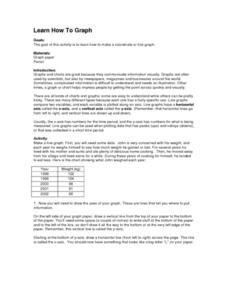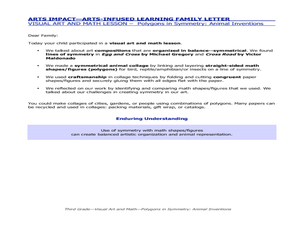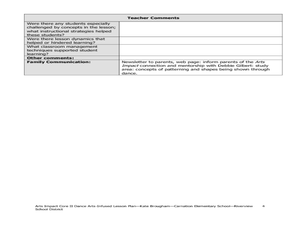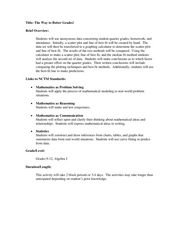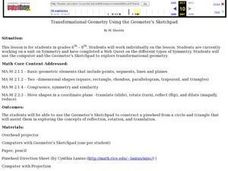Curated OER
Learn How to Graph
Students examine various types of charts and discover how to construct a line graph. Using graph paper, they construct a graph displaying weight loss over a five-year period. They draw copnclusions from the completed graphs.
Curated OER
Skin and Sports
The topic is protecting our own protective covering: the skin. In particular, the information deals with sweating as a means of temperature regulation and the need to wear clothing appropriate for allowing the process to occur. Learners...
Curated OER
Exploring the Definition of Reflection
Students practice using a protractor and ruler to draw various points and lines. Using a computer, they draw the points and lines in the program and describe the differences between their drawing and the computer's drawing. They complete...
Curated OER
Polygons in Symmetry: Animal Inventions
Fourth graders use polygons to create animal figures with symmetry. In this polygons and symmetry lesson, 4th graders create a symmetrical animal collage by cutting and gluing geometric shapes and figures from math activities.
Curated OER
Mapping Ancient Coastlines
Most of this instructional activity is spent working on the "Bathymetry Worksheet." It includes a graph of the changes in sea level over the past 150,000 years and a bathymetric map of changes in an imaginary coastline over time....
Curated OER
Shapes from Shapes
Geometric shapes are really cool. Examine triangles, quadrilaterals, trapezoids, rhombuses, parallelograms, pentagons, and hexagons with your class. They draw large shapes and small shapes then compare them to understand their shapely...
Curated OER
Solving Systems of Equations
Learners explore the concept of solving systems of equations with two equations and two unknowns. In this solving systems of equations lesson plan, they work through problems of solving systems by substitution, elimination, and graphing....
Curated OER
It's All In How You Look At It
Students work collaboratively to create artistic renderings of digital photographs using a color value scale and grid techniques in this late-elementary school lesson based upon Ted Rose's book Discovering Drawing. The lesson includes a...
Curated OER
Looking and Learning in the Art Museum
Reflect on the art your class can view at a museum. In this art history lesson, students draw six elements of art. They discuss original art versus reproduction artwork and write about their thoughts of a museum. It would be wonderful if...
Curated OER
Keeping Architecture In Perspective
Students create a box, the letter L, a triangle, and a circle in perspective in this lesson introducing the art and career of an Architect. The lesson ephasizes practice in perspective and encourages the use of a local architect as a...
Curated OER
Go Fish
Here is a good art lesson on creating colorful versions of fish. After studying images of a variety of fish, young artists choose one that they want to create an image of. Using some high-quality materials, they create their masterpieces...
Curated OER
Graphing X, Y, Z
Seventh graders explore how proportion controls the image of a drawing. They examine a coordinate plane and discuss plotting. Student experiment drawing an object one size, and then drawing an identical object on a different scale.
Curated OER
Ionic bonding
Young scholars explore ionic bonding. They draw examples of ionic bonding and explain the activities of the electrons of the elements. Students use paper plates and candy to draw electron configurations of given atoms.
Virginia Department of Education
Rational Speed Matching
Ready, set, go! Individuals practice converting rational numbers between fractions, decimals, and percents. A speed game has teams match the three forms of rational numbers on a number line.
Curated OER
Mapping a Site Using a Coordinate Plane
Learners map their playground as if it were an archeological site. They locate objects on the playground and determine their location using coordinate points. A related lesson is Coordinate Grid: Mapping an Archeological Site.
Curated OER
Dancing Polygons and Non-Polygons with Patterns
Second graders study movements. In this dance lesson, 2nd graders draw patterns selecting one to represent through movement with their body.
Curated OER
Circles 1, 2, 3, 4
Here is a way to help your charges identify circles and spheres. In this shapes geometry and technology lesson, students identify and draw circles and explain the related attributes. They recognize circles and spheres while exploring...
Curated OER
The Way to Better Grades!
Pupils collect and analyze data. In this statistics lesson, learners create a scatter plot from their collected data. They use, tables and graphs to analyze the data and mae decisions.
Curated OER
Making Felt Bags
Pupils study the history of bags, pouches and purses. Use of these items spans the entire globe and encompasses practically every civilization. The lesson plan culminates with learners creating their own bag from a variety of choices....
Curated OER
Phonics: Decode and Write Words with the “Silent e”
What happens when I add an 'e' to the word mad? It becomes made! Decoding and writing words with the silent e is the lesson for today. The class discusses what the e can do to a cvc word, then they practice adding e's to various words in...
Curated OER
Hyperbolas
Students engage in a lesson that covers the concepts related to the graphing of hyperbolas looking at topics like foci, center, vertices, and asymptotes. They find multiple different points in the coordinate plain and then plot the graph.
Curated OER
Transformational Geometry Using the Geometer's Sketchpad
Students complete a webquest on the various types of symmetry. Using a computer, they explore the concepts of transformational geometry and identify points, segments, lines and planes. They experiment with the rotation of a quadrilateral...
Curated OER
Symmetrical Snowflakes
First graders, exploring lines of symmetry, follow directions to create a symmetrical snowflake from their own homemade icing. As a class, they discuss lines of symmetry and determine if specific shapes are symmetrical. After the lesson,...
Pennsylvania Department of Education
Problem Solving with Fractions
Solve story problems using fractions or decimals. Then, determine the reasonableness of answers using estimation.The detailed instructional activity includes essential questions, vocabulary, a materials list, and links to related units.
